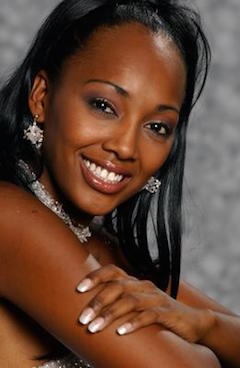Twenty-one-year-old Marva Weatherhorn, the first black Miss Guatemala, represented her country in the 2004 Miss Universe pageant. Her mother’s family immigrated to Guatemala from El Salvador to work harvesting bananas. Ms. Weatherhorn’s father and his parents had emigrated from Jamaica to work for the United Fruit Company in Guatemala. Marva is one of three sisters, and she was born in Puerto Barrios along Guatemala’s Caribbean coast. As a young girl, Marva’s mother and sisters sold jewelry and perfumes to make money, and by seventeen, Marva migrated to Guatemala City, the capital, where she began modeling and learned how to embroider dresses. She attended San Carlos University where she studied international relations with the hopes of going into politics.
During her year-long reign as Miss Guatemala, Weatherhorn stated the most influential person for her (excluding her parents) was Rigoberta Menchu, the outspoken Mayan genocide survivor, and Nobel Peace Prize winner (1992) from Guatemala. She said she admired Rigoberta because she fights “for the rights of the native people in my country.” Marva served as an ambassador of tourism during her reign. In 2015, she was the spokeswoman for the NGO, the Foundation for Eco-development and Conservation (Fundaeco), and she has political aspirations, hoping one day to run for mayor of her hometown.
Weatherhorn has been publicly vocal about issues of race, gender, and beauty since her tenure as Miss Guatemala. In a recent interview, she discussed how her race had shaped her life even within her own family. She explained that her sister, who is white, was thus favored and treated better by her grandparents. Marva was treated less favorably because she is black. Yet she does not seem to resent this fact (she laughs and is puzzled) because she says her father always favored her. In another article, Ms. Weatherhorn urges the men of her country to drop the “machismo” and to “be sweet and kind to women.” She also said that even if men say women are the “weaker sex,” women prove them wrong by “fighting for their ideals.” Marva is also well aware that beauty is really about what is on the inside, and by 2015, she said she would never again enter a beauty pageant.
Some scholars of Guatemala see Weatherhorn’s crown as the Guatemalan state’s attempts to embrace modernization and multiculturalism in the aftermath of a long history of genocide, particularly against the indigenous inhabitants especially during that nation’s civil war (1960-1996). In a country where the harshest racial divide has been between mestizos (usually white) and indigenous communities (especially Mayan), perhaps choosing a black Guatemalan beauty queen is a step toward healing these deep racial divides.

